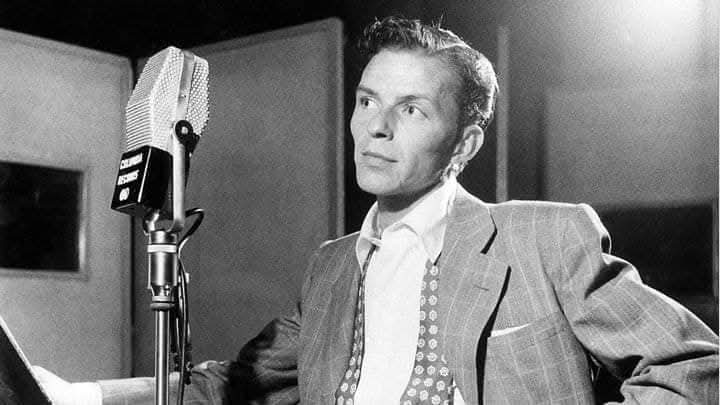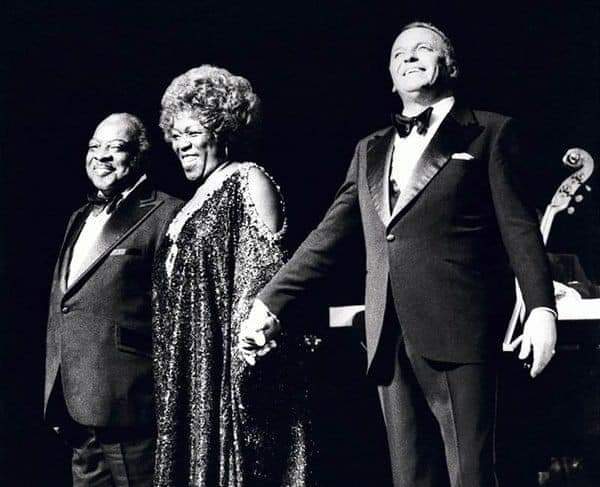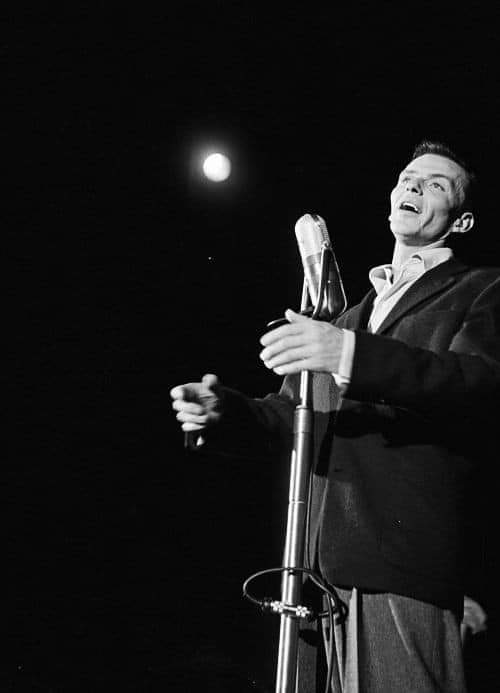
WHEN SINATRA SURRENDERED
WHEN SINATRA SURRENDERED. 1951 Autumn, far from diluting New York into languor, makes the bustle and excitement that are part of its DNA manifest with arrogant intensity. Its geographical features of neon, steel and concrete vibrate with the passage of the human torrent. The clouds seem to stop their flight to contemplate the spectacle: the Roman circus of illusions; promises of new loves that are confused with pain; dreamers with empty hands longing for fame, fortune, the color of other skies; lives sacrificed in honor of the god applause…
The year sheds its skin for the last time. A man walks without catching the virus of haste. Without a hat, the collar of his coat raised, an unlit cigarette on his lips and a few too many drinks, he goes unnoticed among millions of eyes that do not recognize Frank Sinatra, the owner of a voice that had recently caused a heart attack. Times Square. No one had reached as high as him, and yet today there does not seem to be ground willing to stop his fall.
He arrives at the apartment of his good friend Mannie Sachs, which is his roof, his bed and his last drink every time he has to work in New York. Mannie’s not home. Frank pours himself a few more drinks, trying to find some answers at the bottom of the glass, but to no avail. At least, if he manages to sleep tonight, his ghosts will leave him alone for a few hours.
Before taking his usual dose of sleeping pills, he goes to the kitchen to light a cigarette. It is there, in his delirium, where he believes he finds the solution to the torment: taking his life in a slow, sweet and clean way like those songs with which he one day made the world fall in love. Turn on the gas. Thoughts and memories run through your mind…
What has brought the Voice of the 20th Century to this point? Let’s go back a few years…
In 1946 Frank Sinatra enjoys the divine, but above all human, pleasures reserved for the most popular singer of the moment. His art evolves, transcending the adolescent audience to a mature and sophisticated audience. He has presented his first full-length album, “The voice of Frank Sinatra“, and his films are a guarantee of box office hits.
The press and the public are also attentive to his personal life and everything he says. He is one of the few stars without shame to confess their political tendencies, a progressive man, concerned about the rights of disadvantaged minorities, consistent with his origins. Unfortunately, it is a time of paranoia, the dawn of the Cold War, and the nation that won the conflict has embarked on a new crusade against communism. In a clearly short-sighted way, everything related to open-mindedness and civil rights is seen as a red threat.
Sinatra will be one of the artists whose most blood flows from the stigmata; Senator McCarthy will single him out along with other prominent names in culture during his infamous witch hunt. The conservative media is going to attack him and an increasing part of the public is beginning to look at him with resentment. There is resentment because he did not wear a uniform during the War, and to make matters worse he is dedicated to demanding the rights of the poor and immigrants. And there is something even worse: it is discovered that her mother performed illegal abortions. Suddenly, Frank Sinatra isn’t the perfect son-in-law. On the other hand, Sinatra’s public attitude does not help calm things down. Riding unprecedented success, his arrogance leads him to verbally and physically clash with some of his critics, and his sexual behavior challenges the royal decorum of the time.
January 1947. With the help of his old friend Joe Fischetti, Frank is presented with the possibility of meeting Lucky Luciano, the head of Cosa Nostra, who lives in Havana. Fascinated by power in general, Sinatra cannot resist and takes to the sky towards the Cuban capital without knowing that he will be a guest of honor and cover at a meeting of gangsters. A sensible man, upon finding out, had returned home without unpacking his suitcase, and Sinatra will have nothing else, but judgment, what is called judgment, neither. After overcoming the surprise, the singer decides to make his trip profitable by abandoning himself to debauchery. The magic of the city, the intoxicating experience of the forbidden, prevent him from perceiving the tremor and roar of what is coming.
The journalist Lee Mortimer, who had already dedicated bitter paragraphs to Frank Sinatra, is responsible for bringing them to the United States and knowing even the smallest details of Sinatra’s Havana vacation. Exaggerating real facts and inventing the same, he spread a toxic cloud over the singer’s reputation that will rain on him throughout his life and beyond. Everything you have read or heard about Sinatra and the mafia is, to a large extent, the work of “good” Lee Mortimer. Sinatra continued to raise eyebrows, but not with his art. In the media he is portrayed as an adulterer, violent, capricious and a friend of communists and criminals. The masses and the muses abandon him.
May 1947. Frank performs at the Capitol Theater in New York before a cold, half-empty audience; cold in the stalls, and at the exit of the theater, where only a handful of fans await him and the ghostly memory of his glorious premiere at the Paramount in 1945, when the siege of his fans prevented him from leaving the theater for dinner.
Actress Esther Williams said of her “It was like beer. You don’t own the beer, you just enjoy it momentarily.“
She and Frank meet in 1948. She is Ava Gardner, an exquisite and voluptuous challenge to masculinity. A perfect, capricious and temperamental being who tears from Frank what little soul and rhyme he has left at this point. Both sacrifice themselves without hesitation on the pyre of a brutal passion that devastates them with pleasure and pain.
Frank has nothing to lose beyond the chaos that governs his life and career. His music and his cinema are received, at best, with absolute indifference. “The Miracle of the Bells,” an attempt to whitewash his image by playing a Bing Crosby-style priest in “Going My Way,” adds little more to his legacy than critical disdain and an emotional a cappella performance of the song. Ever homeward” with which Frank seems to find his way:
“On the way home,
always on the way
moans the exhausted pilgrim.
Always on the way,
on the way home,
until the trip is over.
warm hugs
and kind faces
that say “welcome home”
Let me lie under the sky
and stop wandering.
On the way home,
always on the way,
moans the exhausted pilgrim.
Always on the way,
on the way home,
until the journey is over.”
And since seriousness seems to get nowhere, Frank once again resorts to his most frivolous side, the one that conquered the public in 1943. He resumes his relationship with Gene Kelly to star in the musical “Take Me to See the Game.” that has been caught with a lower case enthusiasm, despite the excellent selection of musical numbers. This couple will have better luck when they repeat the formula they debuted in the legendary “A Day in New York.”
And, although someone may be drawn to the image of Frank Sinatra dressed as a cheerful and good-natured sailor, when Sinatra has to be Sinatra things are different. It sinks in the popularity polls of the music press. His disordered lifestyle eventually infiltrates his music. In some recording sessions, his voice is so deteriorated that it must be erased until the sound that comes out of his vocal cords resembles what it once was. And when the results are listenable, no one is interested in listening.
The passion he feels for Ava consumes his body, soul, judgment and dignity. On one of their usual nights of debauchery, they both drive at full speed through Palm Springs shooting at streetlights and shop windows. But bad fortune puts a man in his path who is injured. The police arrest the daredevils and Frank has to pay $20,000 to the victim and law enforcement officers so that the facts do not reach the press.
Sinatra is merely known as Ava’s latest conquest, just a bearer of the goddess living her most glorious moment. It is said that Gardner has started a romance with the bullfighter Mario Cabré with whom she filmed the film “Pandora and the Flying Dutchman” in Spain. Frank is crazy with jealousy and wants to fly to Spain but his professional commitments prevent him from doing so.
Tension, fatigue and excesses finally win over Frank. On April 26, 1950, his voice completely broke during a concert and the singer suffered a serious hemorrhage on his vocal cords that forced him to remain silent and undergo intense medical treatment for 3 months. His return to the stage takes place at the London Palladium. The concert can be considered a success, Frank sings as well as he ever did and the audience is spellbound.
But in the United States things remain dark. His new radio and television programs are a complete failure. In his personal life, although he achieves the long-awaited divorce from Nancy to marry Ava, his financial situation is so fragile that he cannot pay the corresponding pension. The erratic behavior and the lack of impact of his work cause the record label and the film studios for which he works to decide to dispense with his services. So what is left for Frank Sinatra but death?
We return to the kitchen of his friend Mannie Sachs‘s apartment, where Frank has tried to commit suicide with gas.
When Frank opens his eyes he sees Mannie, desperate, shaking him. Everything has been a big scare, but if Mannie had come home just a few minutes later he would have found the Voice’s inert body.
It is a crucial moment in Sinatra’s life. Everything that his talent had built over the years has collapsed. Furthermore, popular tastes have changed and it doesn’t seem like there is room for a singer like him. Is this the end of Frank Sinatra? Have you finished writing your book? Not much less. It will be precisely a book (“From Here to Eternity“) that will give Frank a new opportunity to return to the top.
By Mahnuel Muñoz. https://www.facebook.com/mahnuelmunozoficial
If you want to visit more articles about the life of Frank Sinatra enter the following Sinatra Radio 24h link: https://sinatraradio24h.com/category/articles/
We remind you that you can also listen to Sinatra Radio 24 hours on your mobile phone by downloading our free applications for Android in the Play Store https://play.google.com/store/apps/details?id=sinatra.radio24h for iPhone in the Apple Store https://apps.apple.com/app/sinatra-radio-24h/id6599859344






